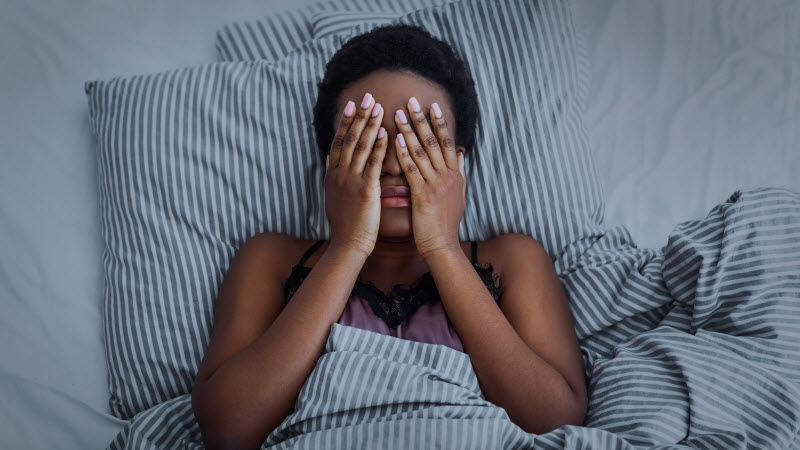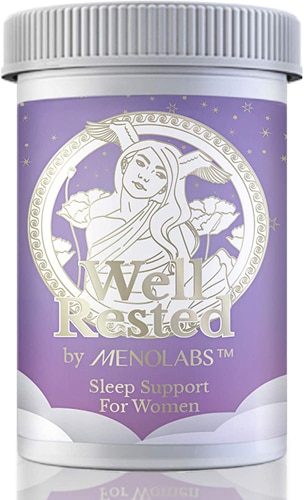[vc_row][vc_column][vc_column_text]Add a new condition to the growing list of pandemic-related ailments.
In a recent survey commissioned by the American Academy of Sleep Medicine, 56% of Americans reported experiencing “COVID-somnia,” a rise in sleep disturbances, since the start of the
COVID-19 pandemic. Other experts call this phenomenon “coronasomnia.”
Of the reported sleep disturbances, trouble falling or staying asleep ranked first (57%). Additional disturbances included sleeping less (46%), getting lower-quality sleep (45%) and experiencing more disturbing dreams (36%).

What is COVID-somnia?
“COVID-somnia can be brought on by multiple stressors: fears about the pandemic, concern for loved ones, financial worries, and limited socialization,” Jennifer Martin, a licensed clinical psychologist who is president-elect of the academy, says in a
news release. “The best way to get healthy sleep during these unprecedented times is to be intentional about your sleep habits and routines.”
The academy says COVID-somnia differs from regular insomnia. How? One difference is that insomnia involves asleep disturbance (problems falling and staying asleep) and daytime symptoms such as fatigue or irritability.
In the survey, men (59%) were more likely than women (54%) to report COVID-somnia sleep interruptions. Those 35 to 44 had the highest rate of COVID-somnia (70%), while those 55 and older were most likely to report trouble falling or staying asleep.
According to the Sleep Foundation, people at high risk of COVID-somnia include:
- Patients with COVID-19
- Frontline workers
- Unpaid caregivers
- Essential workers
- Women
- Young adults
- People of color
The academy says it’s understandable that people are suffering from COVID-somnia, given the stresses and lifestyle changes brought about by the pandemic.
Research published in 2021 adds to the evidence about the rise of sleep issues during the pandemic, with two-thirds of Americans reporting they were snoozing more or less than desired since the pandemic began.
“Once sleep is disrupted, it can impact mental and physical health, which may in turn cause further sleep disruption,” Athena Akrami, a neuroscientist at University College London, says in an
article published by the American Psychological Association (APA). “A vicious cycle may form that is very difficult to diagnose and treat properly.”
How to combat COVID insomnia
The American Academy of Sleep Medicine offers these four tips for combating COVID-somnia:
- Follow a consistent sleep schedule. Most adults should try to get at least seven hours of shuteye every day, regardless of pandemic-related changes to your work routine. In addition, go to bed and get up about the same time every day, including weekends.
- Shut off electronic devices. Reducing your time in front of screens helps your body prepare for sleep, while avoiding news and social media before bed can ease stress. Turn off electronics at least 30 minutes before bedtime.
- Follow a relaxing routine in the evening. Start unwinding at least 30 minutes before bedtime with quiet activities like reading or meditating, or relax by taking a warm bath or shower.
- Create a peaceful sleeping environment. A cool, quiet, dark room is ideal for sleeping. Keep TVs off and store smartphones and other devices outside your room. At the very least, switch your cellphone to silent mode.
In addition, the American Psychological Association recommends establishing a daytime routine that includes exercise, regular mealtimes and exposure to sunlight; avoiding caffeine within 10 hours of bedtime; and not drinking alcohol within three hours of bedtime.
Seeking professional help
The psychologists’ group suggests seeking professional help if your efforts to improve sleep aren’t working.
“We know people are struggling with sleep during the pandemic, and we know what works,” Rébecca Robillard, an assistant professor of psychology at the University of Ottawa who leads clinical sleep research at the Royal Ottawa Institute of Mental Health Research, says in the APA article. “This is now a public health concern that needs to be addressed with large-scale interventions and increased access to [cognitive behavioral therapy for insomnia].”
The Sleep Foundation describes
cognitive behavioral therapy for insomnia (CBT-I for short) as a short, structured, evidence-based approach to helping reverse the symptoms of insomnia. This therapy often requires six to eight sessions with a health care professional.
Can supplements help with COVID insomnia?
Many people in the U.S. and around the world have turned to sleep medication to cope with COVID-somnia. A
study published in 2021 found that among the 2,562 adults who responded to a global survey in March and April 2020, one-fifth had increased their use of sleeping pills.
“Sleep-promoting medicines, however, are generally reserved for only fleeting cases of insomnia, and then prescribed for no more than two weeks. Sleep disorders specialists said there are far more effective approaches to treating COVID-somnia,”
according to Neurology Today, published by the American Academy of Neurology.
As an alternative to medication, some experts recommend trying
melatonin to help treat COVID-somnia.
“Studies have found that melatonin can improve sleep in certain cases, but it isn’t for everyone,” the Sleep Foundation
says. “It is important to be aware of and carefully consider melatonin’s potential benefits and downsides. People who want to use melatonin supplement should also be aware of issues related to dosage and the quality of supplements.”
The American Academy of Sleep Medicine and the American College of Physicians note that there’s not enough evidence about the effectiveness or safety of melatonin for treatment of chronic insomnia to recommend use of the so-called “sleep hormone,”
according to the National Center for Complementary and Integrative Health.[/vc_column_text][/vc_column][/vc_row][vc_row][vc_column][vc_text_separator title="Featured Products" border_width="2"][vc_row_inner equal_height="yes" content_placement="middle" gap="35"][vc_column_inner width="1/3"][vc_single_image image="158102" img_size="full" alignment="center" onclick="custom_link" img_link_target="_blank" css=".vc_custom_1645731506027{padding-right: 7% !important;padding-left: 7% !important;}" link="https://www.vitacost.com/good-day-chocolate-adult-sleep-supplement-dark-chocolate"][/vc_column_inner][vc_column_inner width="1/3"][vc_single_image image="158103" img_size="full" alignment="center" onclick="custom_link" img_link_target="_blank" css=".vc_custom_1645731776656{padding-right: 7% !important;padding-left: 7% !important;}" link="https://www.vitacost.com/jarrow-formulas-soothing-night"][/vc_column_inner][vc_column_inner width="1/3"][vc_single_image image="158104" img_size="full" alignment="center" onclick="custom_link" img_link_target="_blank" css=".vc_custom_1645731825467{padding-right: 7% !important;padding-left: 7% !important;}" link="https://www.vitacost.com/natures-way-melatonin-gummies"][/vc_column_inner][/vc_row_inner][/vc_column][/vc_row]




